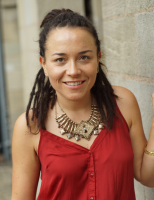Dr. Lisa Johnson

Dissertation
On the Move: Migratory Practices, Intergenerational Narratives and Aspirations of Return in the Mobile Life Pathways of Jamaican Women in Montréal
(Supervisor: Michael Schönhuth, Trier)
By looking at mobility after initial migration, my study aims to understand patterns of migratory movement based on the life experiences of women. Through participant observation, multi-sited ethnography, an analysis that takes socio-economical, historical, cultural, and globalizing factors into account my focus lies on finding an anthropological elaboration for the phenomenon of Jamaican women’s´ aspirations of return.
While historically Jamaican immigrants mainly populated Anglophone metropolitan areas in Canada, Montréal/Québec was since the 1960s a migration hub for Caribbean nurses and domestic workers. However, in scientific literature Jamaicans in Montréal, especially women, play a marginalized role on the research agenda. Here, migration motives, practices and perspectives beyond the analysis of methodological nationalism have to be highlighted. Research issues that arise are e.g.:
• “How does travelling and being mobile after initial migration affect Jamaican female perspectives and practices about place? Are there certain recurring stories, fantasies about places, language and history? Where are conflicting narratives, interests, representation mechanisms?”
The analysis of life stories narrated by women offers an inside view into interpersonal networks including socio-cultural practices in relation to space, belonging, identity and yearning for home. Women shape and maintain hereby actively connections across cultural, geographical and political borders, influenced by dynamic socio-cultural, economic as well as political processes in which migration or re-migration takes place. Female migratory movements evolve into practical, indefinite and reversible tools and a strategy of betterment.
(Supervisor: Michael Schönhuth, Trier)
By looking at mobility after initial migration, my study aims to understand patterns of migratory movement based on the life experiences of women. Through participant observation, multi-sited ethnography, an analysis that takes socio-economical, historical, cultural, and globalizing factors into account my focus lies on finding an anthropological elaboration for the phenomenon of Jamaican women’s´ aspirations of return.
While historically Jamaican immigrants mainly populated Anglophone metropolitan areas in Canada, Montréal/Québec was since the 1960s a migration hub for Caribbean nurses and domestic workers. However, in scientific literature Jamaicans in Montréal, especially women, play a marginalized role on the research agenda. Here, migration motives, practices and perspectives beyond the analysis of methodological nationalism have to be highlighted. Research issues that arise are e.g.:
• “How does travelling and being mobile after initial migration affect Jamaican female perspectives and practices about place? Are there certain recurring stories, fantasies about places, language and history? Where are conflicting narratives, interests, representation mechanisms?”
The analysis of life stories narrated by women offers an inside view into interpersonal networks including socio-cultural practices in relation to space, belonging, identity and yearning for home. Women shape and maintain hereby actively connections across cultural, geographical and political borders, influenced by dynamic socio-cultural, economic as well as political processes in which migration or re-migration takes place. Female migratory movements evolve into practical, indefinite and reversible tools and a strategy of betterment.









